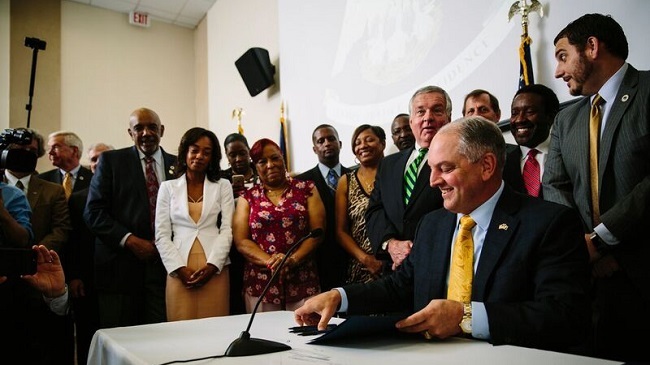Louisiana Adopts Landmark Criminal Justice Reforms
New laws expected to reduce reoffending, save millions of dollars

Louisiana Governor John Bel Edwards, joined by members of the Louisiana Justice Reinvestment Task Force, signs a package of bills in Baton Rouge on June 15.
© The Pew Charitable Trusts
Governor John Bel Edwards (D) signed a broadly bipartisan package of 10 bills June 15 that aims to reduce crime and incarceration by steering less serious offenders away from prison, strengthening alternatives to imprisonment, and clearing away barriers to success during re-entry. With these changes in sentencing and corrections laws, Louisiana is likely to shed its title of the most incarcerated state.
Louisiana officials project that the reforms will reduce the prison and community supervision populations by 10 and 12 percent, respectively, and avert $262 million in prison spending over the next 10 years. Seventy percent of the savings—an estimated $184 million—will be reinvested in programs in jails and the community that reduce recidivism and in services for crime victims.
Six Republicans, including Senate President John A. Alario Jr., two Democrats, including Speaker Pro Tem Walt Leger III, and one independent sponsored S.B. 16, 139, 220, and 221, and H.B. 116, 249, 489, 519, 680, and 681. The package also garnered endorsements from the state District Attorneys Association, business and faith leaders, and coalitions of advocates and community members spanning the political spectrum.
The Pew Charitable Trusts provided nonpartisan data analysis, technical assistance, and staffing to Gov. Edwards, legislative leaders, bill sponsors, and members of the Louisiana Justice Reinvestment Task Force, which developed the policy recommendations. Pew helped develop consensus on the policies among state leaders and a diverse array of local and national stakeholder groups.
The reform package includes reductions in probation and prison terms for drug, property, and other nonviolent crimes; elimination of mandatory minimum prison terms; expansion of opportunities for release from prison, including for some of Louisiana’s longest-serving inmates; restrictions on criminal justice fines and fees, and debt forgiveness for those who make consistent payments; and improvements related to victim notification and input.
Adam Gelb directs the public safety performance project at The Pew Charitable Trusts. Terry Schuster and Emily Levett are officer and associate manager, respectively, with the project.








